Ph.D. - Human Development and Communication Sciences
University of Texas at Dallas - 1995
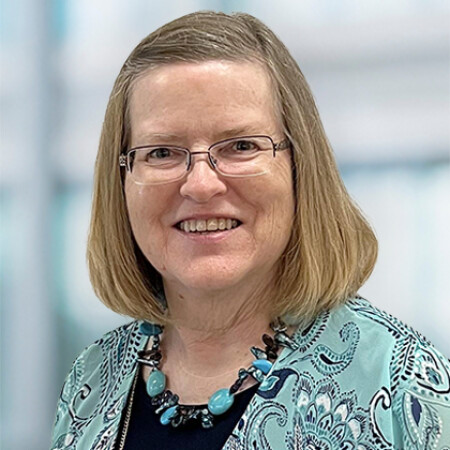
Jackie Clark
Clinical Professor
Research Interests: Clinical significance of speech in noise and cognition; innovative experiential education and impact of limited resources in communities
Professional Preparation
M.S. - Communication Disorders
University of Texas at Dallas - 1987
University of Texas at Dallas - 1987
B.S. - Textile Science; Merchandising
Colorado State University - 1975
Colorado State University - 1975
Research Areas
Research Interests
Some of her research interests involve Efficacy and Value of Telepractice, Abilities of Hearing Technology, Correlates of Aging and speech perception performance, demographics of hearing loss in indigenous populations; cultural influences in help seeking behaviors, effects of noise exposure on emotional, cultural and audiological outlook for adults; improving, updating and confirming efficacy of Clinical Measures used in Audiology practices for adults and pediatric populations. She maintains her international research perspective with collaborations with The University of The Witwatersrand and University of Pretoria in South Africa.Some of the research interests involve an in depth look at pediatric audiology and broad-based clinical audiological practice to differentiate and or predict types of hearing loss. More specifically by looking at the effects of lifestyle, alcohol, tobacco, childhood exposure to noise on a person's ability to understand speech in noise, and whether objective measures correlate closely to self-report. In addition, there is an interest in pursuing modifying parameters of the distortion product and transient evoked otoacoustic emissions to aid in differentiating or predicting specific types of hearing loss. There are occasions when analyzing the auditory brainstem evoked responses become helpful as well to differentiate and predict specific types of hearing loss or hearing disorders.
- Improving, updating and confirming efficacy of Clinical Measures used in Audiology practices for adults and pediatric populations
- Assessing efficacy of new commercially available screening devices
- Normalizing clinical tests that measure individuals sentence recognition performance in the presence of noise
- Assessing cognitive or age contributions to sentence recognition performance in presence of noise
- Assessing efficacy of hearing aid benefit according to sentence recognition performance in the presence of noise
- Asssessing incidence of hearing loss, pathology and impacted ear canals in Sub-Saharan Africa
- Impact of personal lifestyles on tolerance of listening in background noises.
- Cultural attitudes that impact help seeking behaviors
Publications
Recognizing the diverse cultures of patients and their families in the clinic. 34:01; pg 22 – 30. 2022 - ISSN: 1535-2609.
Clark, J.L. (2022). Hearing Screening for All in 2022. The Hearing Journal, 75 (01). 2022 - Publication
Ramatsoma, H., Koekemoer, D., Clark, JL, Malan, K (2021). One-eartip solution for pure tone audiometry and acoustic immittance measures: using insert earphone with an immittance probe ear tip. The International Journal of Audiology, 61:03; doi.org10.1080/14992027.2021.1933623 2021 - publications
Clark, J.L., Donai, J., Kraus, N., Smith, K., Sydlowski, S., Zeng, F-G (2021). Editorial: Audiological needs, solutions in COVID-19. The Hearing Journal 2021 - publications
Clark, J.L. & Swanepoel, D.W. (2021) The World Report On Hearing Care. The International Journal of Audiology. 60:03; pg 161. doi.org/10.1080/14992027.2021.1881318 2021 - publications
Clark, J.L. & Bhutta, M. (2021). Foreward: A report delayed, but just as important: Introduction to Special Edition on Global Ear and Hearing Care. Guest Co-Editors. ENT & Audiology News. 2021 - publications
Clark, J.L., Joubert, K., & Mwamba, A. (2021). Obstacles and Rewards of Audiological Training in LMIC’s. Special Edition on Global Ear and Hearing Care. ENT & Audiology News. 2021 - publications
Mwamba, A. & Clark, J.L. (2021). Using Teleaudiology in Zambia’s Ear and Hearing Desert. Special Edition on Global Ear and Hearing Care. ENT & Audiology News. 2021 - publications
Projects
Audiology Project: Mozambique
2001/03–2001/03 Clark, J.L., Riley, M., Poster at American Academy of Audiology Annual Convention, San Diego, California.Hearing Aid Repairs and Costs: A Single-Center Study
2003/03–2003/03 Jordan, K.M., Clark, J.L., Poster presented at NAFDA Salt Lake City ConferenceAudiology Then, Now, Here and There
2004/10–2004/10 Roeser, R.J., Clark, J.L., Presented at Oklahoma Speech-Language-Hearing Association Annual Conference.Foreign Volunteerism in Audiology
2000/03–2000/03 Clark, J.L., Northrup, B., Presentation to American Academy of Audiology Annual Convention.Mechanisms and Clinical Issues Pertaining to Otoacoustic Emissions
2005/07–2005/05 Clark, J.L., Professional Seminar sponsored by the Johannesburg Speech and Hearing Therapist Association; Johannesburg, South Africa.Additional Information
Professional Affiliations
- 1986 - 1989: A.G. Bell
- 1986 to 2005: American Speech Language and Hearing Association
- 1988 to present: American Auditory Society
- 1988 to present: Texas Speech Language and Hearing Association
- 1989 to present: American Academy of Audiology
- 1990 to 2015: Scott Haug Audiology Foundation
- 1990 to 2010: Association for Research in Otolaryngology
- 1999 to present: International Society of Audiology
- 2000 to present: Texas Academy of Audiology
- 2002 to present: American Board of Audiology
Non-Clinical Employment
- Jan. 2004 - present: Managing Editor; International Journal of Audiology.
Research Experience
- 1986 to 1988: UTD Research Assistant
- 1988 (Dr. Ross Roeser) Aural Rehabilitation, Digital Tactile Devices, and Cochlear Implants
- 1986 - 1987: Master's Thesis, Differences between insert and supra-aural earphones
- 1988 - 1993: Brain Electrical Activity Mapping in Learning Disabled Children
- 1990 (Drs. Terese Finitzo and Sandy Friel-Patti) Pediatric Audiology using behavioral and electrophysiologic (ABR and Brain Mapping) evaluations in clinical and research populations: pediatric otitis media, adult dysfluency, spasmodic dysphonia, and neurogenic disorders.
- 1993 - 1995: Dissertation Topic, Frequency-following responses (brainstem evoked responses) and brainstem timing qualities. Funded by Lear Ashmore Research Grant and Margaret F. Jonsonn Research Fund.
- 1995 - 1997: UTD Research Laboratory Supervisor/Coordinator (Dr. George Moushegian). Establish research protocol, collect, manage data, and oversee administration of all aspects of research lab in Auditory Brainstem Electrophysiology, Auditory and Visual Cortical Mapping. Funded by Margaret F. Jonsonn Research Fund.
- 1996 - 2002: Universal Newborn Hearing Screening Protocols and Equipment
- 1998 - 2000: Supervise the daily administrative activities and students involved in, Hearing Aid Dispensing to those in Economic Need (HADEN) funded by Texas commission for the Deaf and UTD/Callier Center (P.I., Linda Thibodeau).
- 2000: Efficacy study with Welch/Allyn Earwash system using adult subjects (P.I. Ross Roeser).
- 2002 - 2004: Cooperative Ototoxicity Monitoring Program for Baylor Rehabilitation Hospital in-patients.
- 2002 - 2005: Determining effective clinical pediatric audiometric speech protocols
- 2002 - 2006: Validity and replicability of clinically based otoacoustic emission measures
- 2002 - 2006: Consulting with MicroPhonic Inc. Cochlear Implant System to establish protocols, etc. to introduce a new cochlear implant device for review, study, etc. (shared responsibility with Ross Roeser)
- 2003 - 2005: Rate and frequency of hearing aid repairs in a clinical setting
- 2003 - Present: Outcome measures with amplification used in developed and developing countries.
News Articles
Audiologist Helps Mozambiques Hearing-Impaired
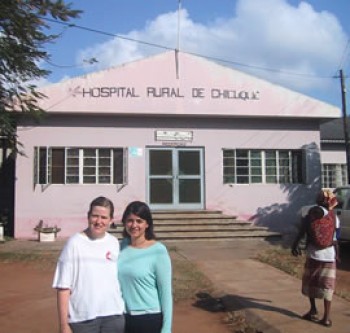 Malaria, 60 indigenous languages and fundraising are just a few of the obstacles that audiologist Jackie L. Clark faces on her annual humanitarian visits to Mozambique to provide audiology services. The professor at UT Dallas’ Callier Center for Communication Disorders is well-equipped to take on the challenges. Her first trip was in 1998 after an invitation from fellow church members in Dallas who had traveled to Chicuque, Mozambique, to teach English the previous year. Clark e-mailed the missionary nurse at the Chicuque Rural Hospital to learn more about the community’s needs. “It's a teaching hospital that trains nurses. I told them I was an audiologist and would be happy to do some training with their medical technicians or whatever the need might be,” she said. “I had no idea what was possible.”
Malaria, 60 indigenous languages and fundraising are just a few of the obstacles that audiologist Jackie L. Clark faces on her annual humanitarian visits to Mozambique to provide audiology services. The professor at UT Dallas’ Callier Center for Communication Disorders is well-equipped to take on the challenges. Her first trip was in 1998 after an invitation from fellow church members in Dallas who had traveled to Chicuque, Mozambique, to teach English the previous year. Clark e-mailed the missionary nurse at the Chicuque Rural Hospital to learn more about the community’s needs. “It's a teaching hospital that trains nurses. I told them I was an audiologist and would be happy to do some training with their medical technicians or whatever the need might be,” she said. “I had no idea what was possible.”
Professor Answers Call to Help Audiologist Treat Patients Remotely
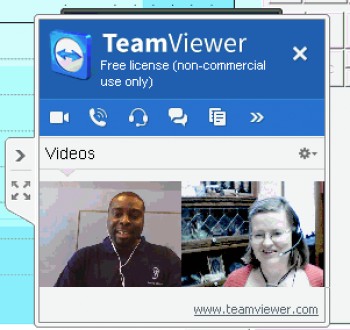 Helping those with hearing problems in Zambia, a developing country larger than Texas with more than 14 million people, requires organization and technical prowess.
Helping those with hearing problems in Zambia, a developing country larger than Texas with more than 14 million people, requires organization and technical prowess.UT Dallas’ Dr. Jackie Clark heard the call.
Clark, a clinical associate professor in the School of Behavioral and Brain Sciences, has helped Dr. Alfred Mwamba establish a teleaudiology practice over the past year in the landlocked, south-central African country.
New Role Helps Widen Scope of Audiologist's Service to Profession
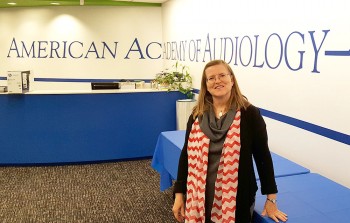 As a child, clinical professor Dr. Jackie Clark was taught to serve other people. Now, in a new leadership role with a major audiology professional organization, she has the opportunity to positively impact an entire profession.
As a child, clinical professor Dr. Jackie Clark was taught to serve other people. Now, in a new leadership role with a major audiology professional organization, she has the opportunity to positively impact an entire profession. Clark MS'87, PhD'95 recently was chosen president-elect of the American Academy of Audiology (AAA). Her term began in July and will be followed by one year as president and another year as past president.
Trip Paves Way for Audiology Research in China
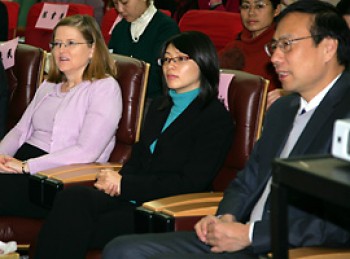 Dr. Jackie Clark, clinical associate professor in the doctor of audiology program at the UT Dallas Callier Center for Communication Disorders, traveled to Beijing recently to lay the foundation for research collaboration in audiology and to exchange information with her Chinese counterparts.
Dr. Jackie Clark, clinical associate professor in the doctor of audiology program at the UT Dallas Callier Center for Communication Disorders, traveled to Beijing recently to lay the foundation for research collaboration in audiology and to exchange information with her Chinese counterparts.Clark was joined by Dr. Lucy Liu, a UT Dallas alumna who studied under Clark and now works in Dallas as an audiologist and speech-language pathologist.
“China is at a critical crossroads for hearing healthcare professionals,” said Clark. “There are so few audiologists but many more otolaryngologists, who are medical doctors that specialize in the discipline of audiology. Defining the roles of the different professionals so that they can better serve the large population is the biggest need at the moment.”